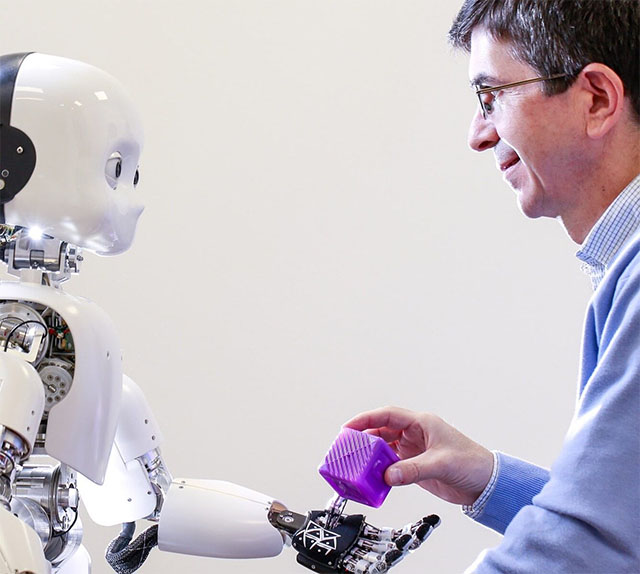Mcr Lit & Phil presents: Cognitive Robotics with Professor Angelo Cangelosi
- Tue 29 Oct 2024
- 6:30 pm
- £15.00

Cognitive Robotics combines insights and methods from Artificial Intelligence (AI), cognitive and biological sciences, and robotics. It’s a highly interdisciplinary approach that sees AI computer scientists and roboticists collaborating closely with psychologists and neuroscientists.
Angelo Cangelosi, Professor of Machine Learning and Robotics, will use the case study of language learning to demonstrate this highly interdisciplinary field, presenting developmental psychology studies on children’s language acquisition and robots’ experiments on language learning.
Growing theoretical and experimental psychology research on action and language processing, and on number learning and gestures in children and adults, clearly demonstrates the role of embodiment in cognition and language processing. In psychology and neuroscience, this evidence constitutes the basis of ‘embodied cognition’, also known as ‘grounded cognition’.
In robotics and AI, these studies have important implications for the design of linguistic capabilities – in particular, language understanding in robots and machines for human-robot collaboration. This focus on language acquisition and development uses Developmental Robotics methods, as part of the wider Cognitive Robotics approach.
During the talk, Angelo will present examples of developmental robotics models and experimental results with the baby robot iCub and with the Pepper robot. One study focuses on the embodiment biases in early word acquisition and grammar learning. The same developmental robotics method is used for experiments on pointing gestures and finger counting to allow robots to learn abstract concepts such as numbers.
Angelo will then present a novel developmental robotics model, and human-robot interaction experiments, on Theory of Mind and its relationship to trust. This section of the presentation will consider both our Theory of Mind of robots’ capabilities, and robots’ own ‘Artificial Theory of Mind’ of our intentions. This will demonstrate that trust and collaboration is enhanced when we can understand the intention of the other agents and when robots can explain to us their decision-making strategies.
The implications for the use of such cognitive robotics approaches for embodied cognition in AI and cognitive sciences, and for robot companion applications, will also be discussed. Angelo’s talk will also consider philosophy of science issues on embodiment and on machine’s understanding of language, the ethical issues of trustworthy AI and robots, and the limits of current big-data large language models.
We hope you’ll join us, Angelo, iCub and Pepper for a really absorbing talk and practical presentation that will really get you thinking.

About the speaker
Angelo Cangelosi is Professor of Machine Learning and Robotics at the University of Manchester and co-director and founder of the Manchester Centre for Robotics and AI. Angelo’s research interests are in cognitive and developmental robotics, neural networks, language grounding, human robot-interaction and trust, and robot companions for health and social care. He was recently selected for the award of the European Research Council (ERC Advanced) grant “eTALK” funded by the UKRI.
Overall, he has secured over £38m in research grants and has produced more than 300 scientific publications. He is Editor-in-Chief of the journals Interaction Studies and IET Cognitive Computation and Systems and has chaired numerous international conferences, including ICANN2022 Bristol, and ICDL2021 Beijing. Angelo’s book Developmental Robotics: From Babies to Robots (MIT Press) was published in January 2015, and translated into Chinese and Japanese. His latest book Cognitive Robotics (MIT Press), coedited with Minoru Asada, was published in 2022.


